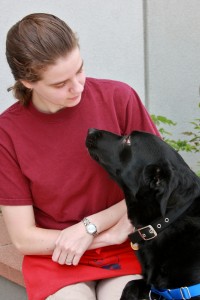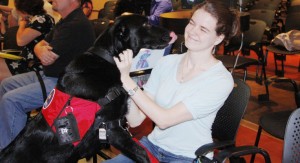 Today I want to highlight a really incredible organization, and I can't do that without waxing poetic on my favorite subject: my dog. But don't worry, it's completely relevant because Jonas is a service dog who was trained by Freedom Service Dogs. He is considered a Skilled Companion, which means that he helps me out at home doing things like picking stuff up that I can't reach, carrying my phone around, and fetching my crutch when I've left it in another room.
Freedom Service Dogs is a non-profit organization here in Denver that trains dogs and places them with clients who have various disabilities. Their dogs can help with any number of things from bracing and balancing to pushing hard to reach buttons. Unlike a lot of service dog organizations, FSD rescues their dogs from local shelters. Trainers visit the shelters regularly, testing strays for the intelligence and temperament they need for such a rigorous job. It costs FSD $25-30,000 to send one dog all the way from the rescue shelter, through the training, and finally pair them up with a deserving client. While they are very conscientious about who their dogs go to, making sure clients are well equipped to handle the animals, Jonas and I are kind of a special case. When I went to FSD, I wasn't looking for a service dog. I was looking for a pet.
Today I want to highlight a really incredible organization, and I can't do that without waxing poetic on my favorite subject: my dog. But don't worry, it's completely relevant because Jonas is a service dog who was trained by Freedom Service Dogs. He is considered a Skilled Companion, which means that he helps me out at home doing things like picking stuff up that I can't reach, carrying my phone around, and fetching my crutch when I've left it in another room.
Freedom Service Dogs is a non-profit organization here in Denver that trains dogs and places them with clients who have various disabilities. Their dogs can help with any number of things from bracing and balancing to pushing hard to reach buttons. Unlike a lot of service dog organizations, FSD rescues their dogs from local shelters. Trainers visit the shelters regularly, testing strays for the intelligence and temperament they need for such a rigorous job. It costs FSD $25-30,000 to send one dog all the way from the rescue shelter, through the training, and finally pair them up with a deserving client. While they are very conscientious about who their dogs go to, making sure clients are well equipped to handle the animals, Jonas and I are kind of a special case. When I went to FSD, I wasn't looking for a service dog. I was looking for a pet.
Josh and I had joked about getting a service dog, but I'd never felt right about it. I'm very good about doing things for myself, and I have a big, brawny husband to manage the things I can't. Like running me up several hundred temple steps in Indonesia. Or cleaning out the shower drain. (Stand back, girls, he's mine.) So I didn't want to snatch a service dog from someone who might need one more than me. I just wanted a pet. But with my balance and strength limitations, I needed a well-behaved pet. Our first dog, Hero, was great, but I was terrified to walk her since she had a tendency to take off after squirrels, rabbits, and small children. I'm sure it was hilarious to see me dragged along behind her, but I wasn't impressed with the Marmaduke impersonation.
Several FSD volunteers and staff members  attend our church, and from them, I learned that they adopt out the dogs that don't make it through the program. This sounded like a dream come true to me. These dogs already have basic obedience training, with either temperament or health issues that make them less than ideal for service work. When I got on FSD's website, I saw Jonas. [Cue dramatic light from the sky and heavenly choir music.] Jonas was fully trained and placed with a client as a full public-access Service Dog. But due to unforeseen anxiety issues, he was not doing well. He was back at FSD and up for adoption when I found him.
attend our church, and from them, I learned that they adopt out the dogs that don't make it through the program. This sounded like a dream come true to me. These dogs already have basic obedience training, with either temperament or health issues that make them less than ideal for service work. When I got on FSD's website, I saw Jonas. [Cue dramatic light from the sky and heavenly choir music.] Jonas was fully trained and placed with a client as a full public-access Service Dog. But due to unforeseen anxiety issues, he was not doing well. He was back at FSD and up for adoption when I found him.
Josh and I went to meet him and everything clicked. Jonas was perfect for me, being very mellow and already trained to walk nicely next to a person with a disability. And I was perfect for him. I don't need him to come with me to scary places like the grocery store or (heaven forbid) Walmart. But with me, he still has a job, a purpose, and more importantly, someone who cuddles with him on the couch. He's my service dog, and I'm his service person. Since our needs matched up so perfectly, FSD “placed” him with me as my Skilled Companion. That means that we didn't have to pay for him (normally they ask for a $300-500 donation for adopted dogs), and we have the support of his trainer for the rest of his life.
Also, I got to go through my own training, learning the secret words that make Jonas do awesome things. I made friends with Bug, Pan, Doppler, Mansfield, Triton and Stryker and the men and women that go with them. Bug, Mansfield and Stryker belonged to Iraq and Afghanistan war veterans. FSD has an amazing program called Operation Freedom to help pair veterans with service dogs.
Jonas still has some anxiety issues, but he does come with me to church where he gets lots of love and affection, which is his favorite thing in the world... besides squeaky toys. But mostly his job is to stay at home and pick stuff up off the floor and get hair all over my carpet.
 So if you're looking for a dog to adopt, or an organization to donate to, or maybe you could use a service dog yourself, check out Freedom Service Dogs. These amazing people have made a big difference in my life.
So if you're looking for a dog to adopt, or an organization to donate to, or maybe you could use a service dog yourself, check out Freedom Service Dogs. These amazing people have made a big difference in my life.
